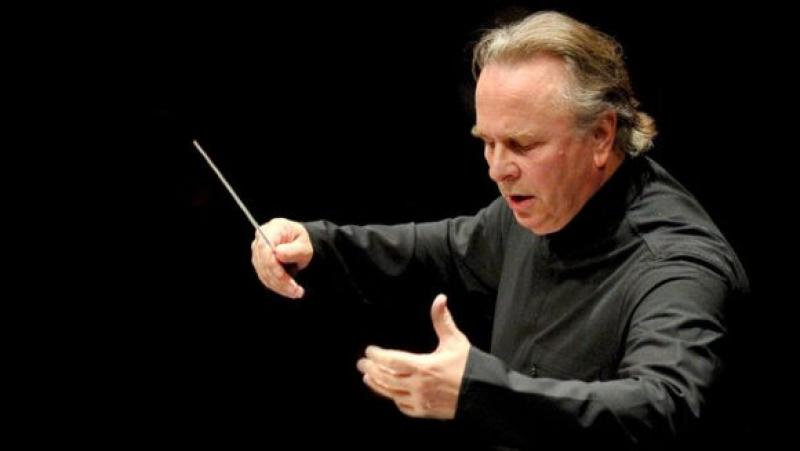Die Meistersinger Act Three, Hallé, Elder, Bridgewater Hall, Manchester | reviews, news & interviews
Die Meistersinger Act Three, Hallé, Elder, Bridgewater Hall, Manchester
Die Meistersinger Act Three, Hallé, Elder, Bridgewater Hall, Manchester
Mark Elder's Mastersingers of Manchester celebrate the Wagner bicentenary in style

The “Mastersingers of Manchester”, about 350 of them, were gathered together by Sir Mark Elder to celebrate the Wagner bicentenary with this performance of Act Three of Die Meistersinger von Nürnberg in its entirety. He also pulled in about 200 orchestral musicians, exploiting the city’s resources just about to the limit.
Sir Mark even broke into song himself in the build-up to the main event. With the help of his assistant conductor Jamie Phillips and soloists and young musicians, some only 12 years old, from the Hallé Youth Orchestra and Chetham’s School of Music, Elder set the scene with excerpts from the previous two acts in entertaining style. And his singing (light tenor) was better than one might have expected.
For the main event, the Hallé orchestra and choir were bolstered by choristers from the RNCM, Chetham’s and the University of Manchester. Sir Mark, a man for the big occasion, has a way of harnessing resources. He also has a way with Wagner. He counts his acclaimed concert performances here of Götterdämmerung and Die Walküre in the past four years as the high points of his 12-year reign. And he has the distinction of having conducted Die Meistersinger at Bayreuth as far back as 1981.
The irrepressible Christopher Purves made the most of Beckmesser, the town clerk everybody wants to cut down to size
Act Three of Meistersinger, lasting two and a quarter hours, is the joyous climax to the comedy, with much jollity and no little drama as the Meistersinger contest reaches its happy denouement, bringing the young knight Walther and the goldsmith’s daughter Eva together at last. There’s nothing comedic about that hypnotic, long, dark opening on lower strings, caressed by Elder. Then in comes Sachs, the cobbler poet, sung with power, warmth and clarity here by Iain Paterson, to get Midsummer’s Day up and running.
The trouble with concert performances is how much play-acting goes on. Much depends on the individual soloist, and the most characterful here was the irrepressible Christopher Purves, making the most of Beckmesser, the town clerk everybody wants to cut down to size. There he is, strumming his lute (actual sound provided by a Celtic harp in the orchestra), tripping over a rostrum and playing up to Sachs with misplaced bravado in an ill-fated hope of winning the song contest – and the prize of the goldsmith’s daughter, Eva.
The piece is crammed with goodies. The young knight Walther’s love song to Eva, supposedly written from his dream about a beautiful woman, has a haunting melody, which becomes his signature tune, expressively sung by the German tenor, Daniel Kirch. And his Eva was finely portrayed by Emma Bell, who has a big rich voice and real stage presence. Then there is the “joyful morning” quintet just before the final scene, in which Sachs, Walther and Eva are joined by the cobbler’s apprentice, David (Allan Clayton) and his lover Magdalene (Sarah Catle). A real highlight.
 The final scene opens with exuberant music signalling all the festive fun of Midsummer’s Day, before changing seamlessly into the opera’s familiar processional theme as the Mastersingers come on parade (through the audience), like a graduation ceremony. At last the choirs came into their own with a shattering “Awake! Day draws near” and then “Hail to Sachs”. He, in turn, answers modestly, but famously urges them to “honour your German masters”. If all else should be lost, holy German art will survive (Richard Wagner, pictured above).
The final scene opens with exuberant music signalling all the festive fun of Midsummer’s Day, before changing seamlessly into the opera’s familiar processional theme as the Mastersingers come on parade (through the audience), like a graduation ceremony. At last the choirs came into their own with a shattering “Awake! Day draws near” and then “Hail to Sachs”. He, in turn, answers modestly, but famously urges them to “honour your German masters”. If all else should be lost, holy German art will survive (Richard Wagner, pictured above).
This was another impressive and ambitious achievement by Elder. He steered the orchestral playing and the singing of the massed choirs with exhilaration and sensitivity, and the audience responded with a rousing standing ovation. I particularly liked the way in which Elder drew a parallel between the young musical “apprentices” of Manchester, who hope to become “masters”, and those of Nuremberg, celebrated here.
rating
Explore topics
Share this article
Add comment
The future of Arts Journalism
You can stop theartsdesk.com closing!
We urgently need financing to survive. Our fundraising drive has thus far raised £49,000 but we need to reach £100,000 or we will be forced to close. Please contribute here: https://gofund.me/c3f6033d
And if you can forward this information to anyone who might assist, we’d be grateful.

Subscribe to theartsdesk.com
Thank you for continuing to read our work on theartsdesk.com. For unlimited access to every article in its entirety, including our archive of more than 15,000 pieces, we're asking for £5 per month or £40 per year. We feel it's a very good deal, and hope you do too.
To take a subscription now simply click here.
And if you're looking for that extra gift for a friend or family member, why not treat them to a theartsdesk.com gift subscription?

Comments
the best ever at the B Hall,